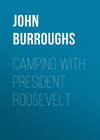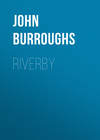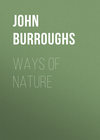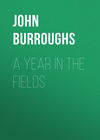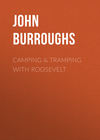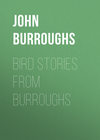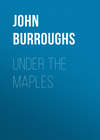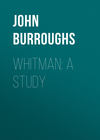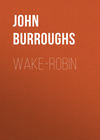Buch lesen: «Camping with President Roosevelt», Seite 5
WILD ELK
Now and then the President, looking back and seeing what slow progress I was making, would beckon to me impatiently, and I could fancy him saying, "If I had a rope around him, he would come faster than that!" Once or twice I lost sight of both him and the elk; the altitude was great, and the horse was laboring like a steam-engine on an upgrade. Still I urged him on. Presently, as I broke over a hill, I saw the President pressing the elk up the opposite slope. At the brow of the hill he stopped, and I soon joined him. There on the top, not fifty yards away, stood the elk in a mass, their heads toward us and their tongues hanging out. They could run no farther. The President laughed like a boy. The spectacle meant much more to him than it did to me. I had never seen a wild elk till on this trip, but they had been among the notable game that he had hunted. He had traveled hundreds of miles, and undergone great hardships, to get within rifle range of these creatures. Now here stood scores of them, with lolling tongues, begging for mercy.
After gazing at them to our hearts' content, we turned away to look up our companions, who were nowhere within sight. We finally spied them a mile or more away, and, joining them, all made our way to an elevated plateau that commanded an open landscape three or four miles across. It was high noon, and the sun shone clear and warm. From this lookout we saw herds upon herds of elk scattered over the slopes and gentle valleys in front of us. Some were grazing, some were standing or lying upon the ground, or upon the patches of snow. Through our glasses we counted the separate bands, and then the numbers of some of the bands or groups, and estimated that three thousand elk were in full view in the landscape around us. It was a notable spectacle. Afterward, in Montana, I attended a council of Indian chiefs at one of the Indian agencies, and told them, through their interpreter, that I had been with the Great Chief in the Park, and of the game we had seen. When I told them of these three thousand elk all in view at once, they grunted loudly, whether with satisfaction or with incredulity, I could not tell.
In the midst of this great game amphitheatre we dismounted and enjoyed the prospect. And the President did an unusual thing, he loafed for nearly an hour, – stretched himself out in the sunshine upon a flat rock, as did the rest of us, and, I hope, got a few winks of sleep. I am sure I did. Little, slender, striped chipmunks, about half the size of ours, were scurrying about; but I recall no other wild thing save the elk.
TOWER FALLS
From here we rode down the valley to our third camp, at Tower Falls, stopping on the way to eat our luncheon on a washed boulder beside a creek. On this ride I saw my first and only badger; he stuck his striped head out of his hole in the ground only a few yards away from us as we passed.
Our camp at Tower Falls was amid the spruces above a cañon of the Yellowstone, five or six hundred feet deep. It was a beautiful and impressive situation, – shelter, snugness, even cosiness, – looking over the brink of the awful and the terrifying. With a run and a jump I think one might have landed in the river at the bottom of the great abyss, and in doing so might have scaled one of those natural obelisks or needles of rock that stand up out of the depths two or three hundred feet high. Nature shows you what an enormous furrow her plough can open through the strata when mowing horizontally, at the same time that she shows you what delicate and graceful columns her slower and gentler aerial forces can carve out of the piled strata. At the Falls there were two or three of these columns, like the picket-pins of the elder gods.
MOUNTAIN SHEEP
Across the cañon in front of our camp, upon a grassy plateau which was faced by a wall of trap rock, apparently thirty or forty feet high, a band of mountain sheep soon attracted our attention. They were within long rifle range, but were not at all disturbed by our presence, nor had they been disturbed by the road-builders who, under Captain Chittenden, were constructing a government road along the brink of the cañon. We speculated as to whether or not the sheep could get down the almost perpendicular face of the chasm to the river to drink. It seemed to me impossible. Would they try it while we were there to see? We all hoped so; and sure enough, late in the afternoon the word came to our tents that the sheep were coming down. The President, with coat off and a towel around his neck, was shaving. One side of his face was half shaved, and the other side lathered. Hofer and I started for a point on the brink of the cañon where we could have a better view.
"By Jove," said the President, "I must see that. The shaving can wait, and the sheep won't."
WATCHING THE "STUNT"
So on he came, accoutred as he was, – coatless, hatless, but not latherless, nor towelless. Like the rest of us, his only thought was to see those sheep do their "stunt." With glasses in hand, we watched them descend those perilous heights, leaping from point to point, finding a foothold where none appeared to our eyes, loosening fragments of the crumbling rocks as they came, now poised upon some narrow shelf and preparing for the next leap, zigzagging or plunging straight down till the bottom was reached, and not one accident or misstep amid all that insecure footing. I think the President was the most pleased of us all; he laughed with the delight of it, and quite forgot his need of a hat and coat till I sent for them.
In the night we heard the sheep going back; we could tell by the noise of the falling stones. In the morning I confidently expected to see some of them lying dead at the foot of the cliffs, but there they all were at the top once more, apparently safe and sound. They do, however, occasionally meet with accidents in their perilous climbing, and their dead bodies have been found at the foot of the rocks. Doubtless some point of rock to which they had trusted gave way, and crushed them in the descent, or fell upon those in the lead.
TROUT FISHING
The next day, while the rest of us went fishing for trout in the Yellowstone, three or four miles above camp, over the roughest trail that we had yet traversed on horseback, the President, who never fishes unless put to it for meat, went off alone again with his lunch in his pocket, to stalk those sheep as he had stalked the elk, and to feel the old sportsman's thrill without the use of firearms. To do this involved a tramp of eight or ten miles down the river to a bridge and up the opposite bank. This he did, and ate his lunch near the sheep, and was back in camp before we were.
We took some large cut-throat trout, as they are called, from the yellow mark across their throats, and I saw at short range a black-tailed deer bounding along in that curious, stiff-legged, mechanical, yet springy manner, apparently all four legs in the air at once, and all four feet reaching the ground at once, affording a very singular spectacle.
RETURN TO FORT YELLOWSTONE
We spent two nights in our Tower Falls camp, and on the morning of the third day set out on our return to Fort Yellowstone, pausing at Yancey's on our way, and exchanging greetings with the old frontiersman, who died a few weeks later.
